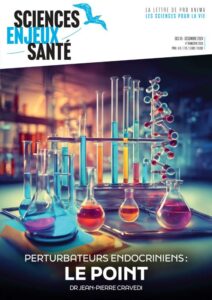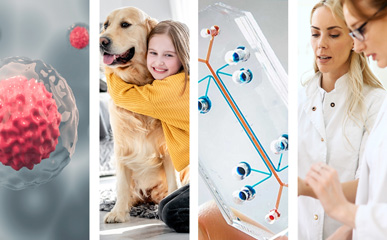
Advice for bad toxicologists, Notify your transitional initiative, AI beats experts in predicting quality of ‘mini-organs’ and more
News on non-animal methods
JANUARY 13 - 17, 2025NEWS, REPORTS & POSITION STATEMENTS
1. Advice for bad toxicologists
For the beginning of 2025 and the launching of the NAM Journal, Richard R. Rabbit, aka Thomas Hartung put together a list of 10 Commandments for Bad Toxicologists. Among these, we can highlight for example “Stick to the ancient methods”, “Confuse complexity with precision”, or “Stick to animal testing even when it fails”.
With this foolproof advice, you’ll never have to confront the challenges of real scientific progress. Let’s dive in !
2. Towards a code of conduct for the re-use and integration of VHT
The deliverable D6.2 of the EDITH Project is designed as an in-depth analysis of the essential elements to be considered when proceeding towards establishing a code of conduct, with the aim of serving as a compliance-enabler and an accountability tool under the general data protection regulation, for the re-use and integration of Virtual Human Twins (VHT) in healthcare.
A newly published document analyzes the current EU general regulatory and policy scenario in the AI and data-driven landscape and sets out a comprehensive state-of-the-art on data anonymization, data pseudonymization and privacy-enhancing technologies, both from a technical and a legal perspective, highlighting the key role that synthetic data may play in the future.
3. AI needs natural language to give structure to biology
Virtual models will enable research to predict how cell states will change in response to chemical perturbations. Protein language models will enable scientists to identify better enzymes for degrading plastics or protein binders that have more drug-like properties.
Real biology discoveries look somewhat different. The issue is that machine learning models work extremely well on structured data, and so all the foundation models that are being built are highly structured. Biology is poorly structured. It will be aesthetically pleasing if it turns out that our engineered representations are yet again insufficient to study biology and that good old natural language is simply another such tool that we have found in nature that must be applied to unravel mysteries of biology.
4. Status quo, barriers and drivers for regulatory acceptance and use of NAM in human health risk assessment
New Approach Methodologies (NAMs) are considered a promising avenue toward modernisation of chemical risk assessment practices but their implementation in practice has been slow. A new article aims to investigate the perspectives of human health risk assessors on the status quo, barriers and drivers of the acceptance and use of NAMs across different regulatory frameworks.
Among other things, the article highlights the importance of considering human health risk assessors’ needs and prerequisites to foster bottom-up coordinated efforts and to ensure the success of top-down legal and institutional change to incorporate NAMs in regulatory risk assessment.
INTERVIEWS, NOMINATIONS & AWARDS
5. SeqVerify : a tool for comprehensive cell line quality assessment
During the last decade, advances in genome editing and pluripotent stem cell (PSC) culture have let researchers generate edited PSC lines to study a wide variety of biological questions. However, abnormalities in cell lines such as mutations, on-target and off-target editing errors, can arise during PSC culture or due to undesired editing outcomes.
In a podcast hosted by Martin Pera, Editor-in-Chief, Stem Cell Reports and The Jackson Laboratory, Wyss Core Faculty member George Church and a former graduate student from his lab, Merrick Pierson Smela, discuss a new computational tool, SeqVerify, that analyzes short-read whole genome sequencing data for quality control of wild-type or edited PSCs.
TOOLS, PLATFORMS, CALLS
6. Abstract submissions for WC13 are now open
Abstract submission for World Congress 13 (WC13) is now open ! 3Rs Integrating 3 Worlds : Human, Animal and Environmental Health. Be the catalyst of change and shape tomorrow’s future with your contribution. Present groundbreaking research, showcase visionary projects, and drive dynamic discussions in the Scientific Program of the Congress.
Submissions can only be made through the online portal. Once you submit your abstract, you will receive a confirmation email. All abstracts must be submitted under one of the four designated tracks. Abstract submission deadline is February 24, 2025 (15:00 CET).
Read more and submit your abstract
7. EC Roadmap : Notify your transitional initiative
The European Commission (EC) has decided to establish a dynamic catalogue of ‘transitional initiatives’, which are planned courses of action including one or more activities, outputs and importantly expected outcomes that contribute to the phasing out of animal testing in the regulatory assessment of chemicals. The catalogue will be a living document and made publicly available.
The EC welcomes notification of any initiative contributing directly or indirectly to the replacement or reduction of animal use in the safety assessment of chemicals. Notifications can be made by individuals on behalf of any stakeholder or team of stakeholders (e.g. academia, industry, EU agencies, Member State authorities, NGOs). Inclusion of an initiative in the list does not imply endorsement or formal recognition by the Commission. New initiatives can be notified at any time, both during the development of the roadmap and subsequently during its implementation. While there are no formal criteria for transitional initiatives, they should describe plausible pathways to impact.
8. The FDA is calling all Artificial Intelligence (AI) innovators
Pre-register today to join solving tough AI problems through the precisionFDA Generative AI (GenAI) Community Challenge : Democratizing and Demystifying AI. The latest precisionFDA Challenge, hosted by FDA’s Office of Digital Transformation, will launch on January 10, 2025. Participants will help push the boundaries of what is possible with GenAI to help shape the future of public health.
Submit your innovative solutions by February 28, 2025. Spread the word by sharing this opportunity with others who may be interested in this crowdsourcing Challenge.
9. DDW is looking ahead to its Spring issue
Drug Discovery World is looking for contributed articles that are non-promotional and thought-leadership based on some of the following topics : Spatial biology, Therapeutic antibodies, Stem cells, The role of quantum computing in drug development, Where are the opportunities in mRNA-based therapeutics?, Cancer research.
If you have a pitch for a story outside of these features, then you can get in touch as there is always scope within the magazine and DDW website.
INDUSTRY, BIOTECH & PARTNERSHIPS
10. £1M awarded to alternative approaches to better predict developmental toxicity
Embryo-fetal development studies are conducted in pregnant animals in two species (typically rat and rabbit) to evaluate the potential for a drug to cause harm to a developing embryo or fetus (teratogenicity) for drugs that are intended for use in women of child-bearing potential.
The NC3Rs has awarded the team led by Dr Amer Jamalpoor at Toxys B.V further funding of £1M to further develop and qualify stem cell-based assays to reduce the reliance on in vivo embryo-fetal development studies and provide insights into species-specific effects to improve translation and human relevancy. “I am extremely honoured to lead the CrossDART project, a pioneering initiative fostering the adoption of New Approach Methodologies to predict species-specific in vivo developmental toxicity and driving progress toward animal-free toxicity testing”, says Dr Amer Jamalpoor.
SCIENTIFIC DISCOVERIES & PROTOCOLS
11. An immunocompetent human kidney on-a-chip model to study renal inflammation and immune-mediated injury
Kidney damage and dysfunction is an emerging health issue worldwide resulting in high morbidity and mortality rates. Numerous renal diseases are recognized to be driven by the immune system. Despite this recognition, the development of targeted therapies has been challenging as knowledge of the underlying mechanism and complex interactions remains insufficient.
A new study describes the establishment of a human immunocompetent 3D in vitro co-culture model of the proximal tubule (PT) in a novel high-throughput microfluidic platform that can be used to study renal functionality and inflammatory processes.
12. AI beats experts in predicting future quality of ‘mini-organs’
Researchers from Kyushu University and Nagoya University in Japan have developed a model that uses artificial intelligence (AI) to predict organoid development at an early stage. The model, which is faster and more accurate than expert researchers, could improve the efficiency and lower the cost of culturing organoids.
In their study, published in Communications Biology on December 6, 2024, the researchers focused on predicting the development of hypothalamic-pituitary organoids.


